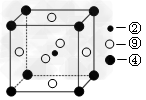【三选一----选修物质结构与性质】
下表为长式周期表的一部分,其中的编号代表对应的元素。

请回答下列问题:
(1)表中属于d区的元素是_____________(填编号)。
(2)科学发现,②、④、⑨三种元素的原子形成的晶体具有超导性,其晶胞的结构特点如图所示(图中②、④、⑨分别位于晶胞的体心、顶点、面心),则该化合物的化学式为______________(用对应的元素符号表示)。

(3)元素②的一种氢化物是重要的化工原料,常把该氢化物的产量作为衡量石油化工发展水平的标志。有关该氢化物分子的说法正确的是____________ 。
A.分子中含有分子间的氢键
B.属于含有极性键的非极性分子
C.只含有4个sp-s的σ键和1个p-p的π键
D.该氢化物分子中②原子采用sp2杂化
(4)某元素的价电子排布式为nsnnpn+1,该元素原子的核外最外层电子的孤对电子数为___________;该元素与元素①形成的18电子的X分子(分子量32)的电子式为___________;该元素还可与元素①形成10电子的气体分子Y(分子量17),将过量的Y气体通入盛有硫酸铜水溶液的试管里,现象为________________。
(5)下表为原子序数依次增大的短周期元素A~F的第一到第五电离能数据。 请回答:表中的金属元素是_____________(填字母);若A、B、C为原子序数依次增大的同周期相邻元素,表中显示B比A和C的第一电离能都略大,其原因是____________________。
